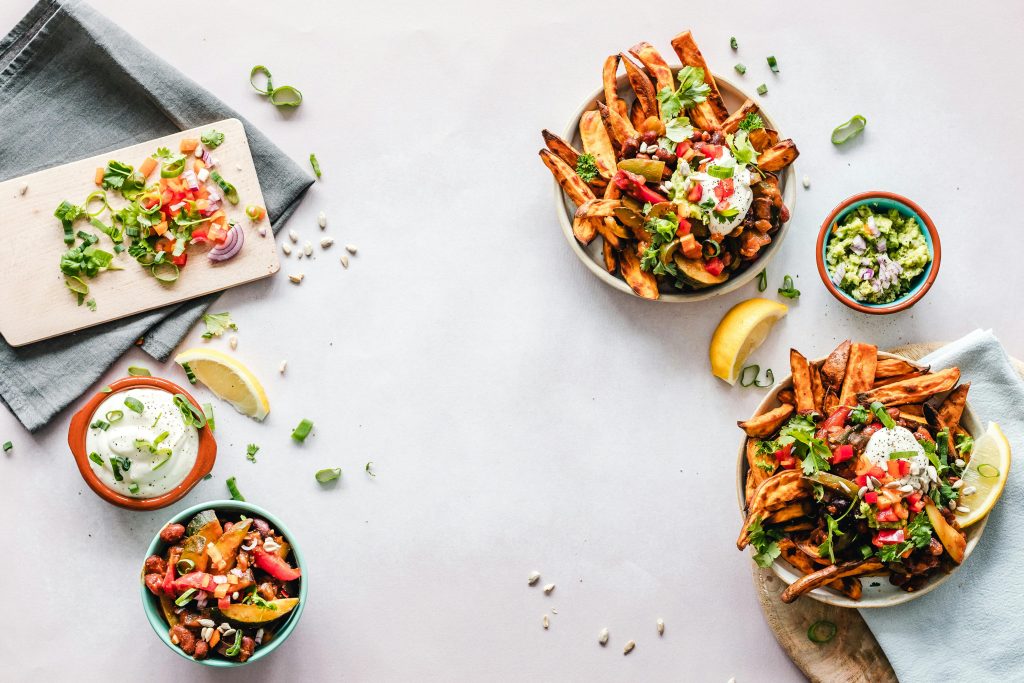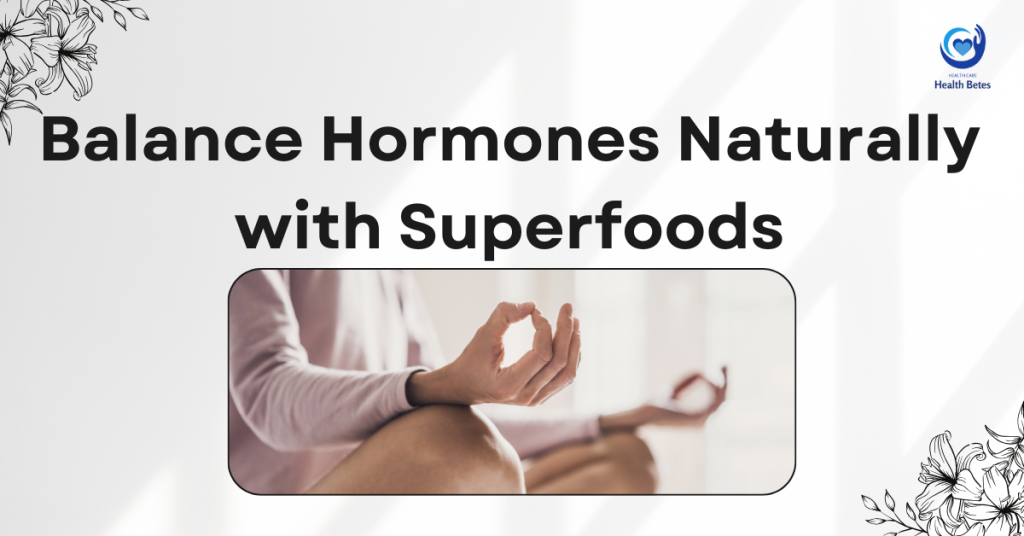Balance Your Body Naturally!
What Causes Hormonal Imbalances?
Hormones are your body’s chemical messengers. They control everything from your energy levels and mood to metabolism and sleep. But sometimes, things go off track. Here are some common causes of hormonal imbalances:
Poor Diet: Eating too much sugar, processed foods, or unhealthy fats can mess with insulin, cortisol, and estrogen.
Stress Overload: When you’re stressed, your body produces too much cortisol, which can throw other hormones out of balance.
Lack of Sleep: Not getting enough rest can disrupt melatonin, the sleep hormone, and increase cravings for junk food.
Toxins in Food & Environment: Chemicals in processed foods, plastic containers, and even air pollution can affect your thyroid and estrogen levels.
Gut Health Issues: Your gut bacteria play a key role in hormonal regulation, so if your gut is unhealthy, your hormones might be, too.
How Does Food Impact Hormones?
The food you eat sends signals to your body. Some foods help balance hormones naturally, while others can make things worse.
Here’s how diet plays a role:
Healthy Fats: Support hormone production and reduce inflammation. (Example: Avocados, nuts, olive oil)
Protein: Helps create essential hormones and keeps blood sugar stable. (Example: Eggs, lean meats, salmon)
Fiber-Rich Foods: Support gut health, which is crucial for hormonal balance. (Example: Flaxseeds, lentils, whole grains)
🫐 Antioxidants & Anti-Inflammatory Foods: Fight oxidative stress, which can damage hormone function. (Example: Blueberries, turmeric, ginger)
🥛 Probiotics: Keep your gut microbiome healthy, which directly affects hormone balance. (Example: Yogurt, kefir, kimchi)
The Best Diet for Hormonal Changes
Now that you know how food impacts hormones, let’s talk about the best diet for hormonal balance. You don’t need to follow a strict plan—just focus on whole, nutrient-dense foods that nourish your body.
1. Eat Healthy Fats for Hormonal Balance
Your body needs good fats to make hormones like estrogen and testosterone. If you’re low on healthy fats, your hormones can get out of whack.
Best fats for hormone balance:
Avocados
Extra virgin olive oil
Nuts (almonds, walnuts, cashews)
Chia seeds & flaxseeds (great for estrogen balance)
Fatty fish (salmon, sardines, mackerel)
Avoid unhealthy fats like vegetable oils, margarine, and fried foods—they cause inflammation and disrupt hormone production.

2. Prioritize Protein to Support Hormonal Health
Protein is essential for hormone production. It helps regulate insulin, hunger hormones, and metabolism. If you don’t get enough protein, you might feel hungrier, more tired, and experience blood sugar spikes.
Best protein sources for hormone balance:
Eggs (rich in nutrients that support estrogen and testosterone)
Grass-fed beef (packed with zinc, which supports testosterone production)
Wild-caught salmon (loaded with omega-3s for hormonal health)
Lentils and chickpeas (plant-based proteins that support thyroid function)
Greek yogurt (great for gut health and hormone balance)
3. Boost Fiber Intake for Hormone Detoxification
Fiber helps flush out excess hormones, especially estrogen, which can build up and cause issues like weight gain, PMS, and hormonal acne.
Best fiber-rich foods for hormone balance:
Flaxseeds (rich in lignans that support estrogen balance)
Whole grains (quinoa, oats, brown rice)
Beans & lentils (great for insulin regulation)
Leafy greens (spinach, kale, collard greens)
Avoid refined carbs like white bread, pastries, and sugary cereals—they cause insulin spikes and hormonal crashes.
4. Reduce Inflammation with Antioxidant-Rich Foods
Chronic inflammation is one of the biggest hormone disruptors. Eating anti-inflammatory foods can help keep your cortisol, insulin, and estrogen levels in check.
Best anti-inflammatory foods for hormones:
Blueberries & raspberries (loaded with antioxidants)
Turmeric (reduces inflammation and supports cortisol balance)
Ginger (great for reducing bloating and hormone-related stress)
Dark leafy greens (support liver detox for estrogen balance)
5. Keep Your Gut Healthy with Probiotic & Fermented Foods
Your gut microbiome plays a huge role in hormonal health. If your gut is off, your hormones will be, too.
Best probiotic foods for hormone balance:
Greek yogurt & kefir
Sauerkraut & kimchi
Kombucha
Miso & tempeh
Avoid too much sugar and processed foods—they can kill good gut bacteria and lead to hormonal imbalances.
Top 10 Foods to Support Hormonal Changes
The right foods can help regulate estrogen, testosterone, cortisol, and insulin levels, keeping your energy, mood, and metabolism in check. Here are the best hormone-balancing foods you need to include in your diet.
1. Healthy Fats for Hormonal Balance
Fats often get a bad reputation, but healthy fats are essential for hormone production. They help create sex hormones like estrogen and testosterone, while also reducing inflammation.
Best fats for hormone balance:
Avocados – Rich in monounsaturated fats that support estrogen balance.
Nuts (almonds, walnuts, cashews) – Great for reducing inflammation and stabilizing blood sugar.
Chia seeds & flaxseeds – High in lignans, which help balance estrogen levels.
Olive oil – A powerful anti-inflammatory fat that supports hormone function.
Fatty fish (salmon, sardines, mackerel) – Loaded with omega-3s, which reduce stress hormones like cortisol.
Avoid unhealthy fats like vegetable oils, margarine, and fried foods—they can trigger inflammation and disrupt hormone production.

2. Protein-Rich Foods for Hormonal Health
Protein is key for hormone production and muscle maintenance. It also helps regulate insulin and hunger hormones to prevent cravings and mood swings.
Best protein sources for hormone balance:
Eggs – Packed with nutrients that support testosterone and estrogen balance.
Wild-caught salmon – A great source of omega-3s and high-quality protein.
Grass-fed beef – Rich in zinc, which boosts testosterone levels.
Lentils & chickpeas – Excellent plant-based proteins that support thyroid function.
Greek yogurt – High in probiotics, which improve gut health and hormone regulation.
3. Fiber-Rich Foods to Balance Hormones
Fiber helps flush out excess estrogen from the body and keeps digestion running smoothly. This is crucial for women going through menopause or people struggling with estrogen dominance.
Best fiber-rich foods for hormone health:
Flaxseeds – Contain lignans, which help regulate estrogen levels.
hole grains (quinoa, oats, brown rice) – Help balance blood sugar and insulin.
Leafy greens (spinach, kale, collards) – Support detoxification and hormone balance.
Beans & lentils – Aid in digestion and help regulate progesterone levels.
4. Estrogen-Boosting Foods (For Women During Menopause)
Some women experience low estrogen during menopause, leading to hot flashes, mood swings, and bone loss. Adding phytoestrogen-rich foods can help regulate estrogen naturally.
Best foods for menopause support:
Flaxseeds – Rich in phytoestrogens, which mimic estrogen in the body.
Soy (tofu, tempeh, edamame) – Contains isoflavones that can help balance hormones.
Sesame seeds – Support estrogen production and improve bone health.
5. Testosterone-Boosting Foods (For Energy & Muscle Strength)
Testosterone isn’t just important for men—it’s essential for women too, helping with muscle strength, mood, and energy levels.
Best testosterone-boosting foods:
Eggs – Contain healthy cholesterol, a building block for testosterone.
Beef & chicken – High in zinc and vitamin D, crucial for testosterone production.
Spinach & pomegranates – Help naturally boost testosterone levels.
6. Anti-Inflammatory Foods for Hormonal Health
Chronic inflammation is one of the biggest hormone disruptors. Eating anti-inflammatory foods can help balance cortisol, insulin, and estrogen.
Best anti-inflammatory foods:
Turmeric & ginger – Powerful anti-inflammatory spices.
Blueberries & raspberries – Rich in antioxidants that protect hormone health.
Dark leafy greens – Support liver detox for estrogen balance.
7. Adaptogenic Herbs for Hormone Regulation
Adaptogens help your body handle stress and regulate hormones naturally.
Best adaptogenic herbs for hormones:
Maca root – Boosts energy and libido.
Ashwagandha – Lowers cortisol (stress hormone).
Holy basil – Helps balance blood sugar and reduce anxiety.
8. Probiotic & Gut-Healthy Foods
Your gut and hormones are closely linked. Probiotics improve gut bacteria, which helps balance estrogen, cortisol, and insulin.
Best probiotic foods for hormone balance:
Greek yogurt & kefir – Packed with gut-friendly bacteria.
Sauerkraut & kimchi – Fermented foods that improve digestion.
Miso & tempeh – Great plant-based probiotic sources.
9. Hydration & Detox Foods for Hormones
Drinking enough water and eating detox-friendly foods help flush out toxins that disrupt hormones.
Best hydration & detox foods:
Lemon water – Supports liver detoxification.
Green tea – Contains catechins that help regulate hormones.
Celery & cucumbers – Keep the body hydrated and reduce bloating.
10. Best Teas & Spices for Hormonal Balance
Herbal teas and spices can naturally regulate hormones and reduce symptoms of imbalance.
Best teas for hormone balance:
Peppermint tea – Helps with hormone-related bloating and digestion.
Cinnamon – Supports blood sugar balance.
Turmeric tea – Reduces inflammation and cortisol spikes.
Foods to Avoid for Better Hormonal Balance
Just as some foods help, others can disrupt hormones and cause imbalances. Here’s what to cut back on:
1. Refined Sugar & Processed Carbs
Too much sugar leads to insulin resistance, weight gain, and energy crashes.
Avoid: Candy, sodas, white bread, pastries.
2. Dairy & Gluten (For Some People)
Some people are sensitive to dairy and gluten, which can cause hormonal acne and bloating.
Avoid: Processed dairy (cheese, ice cream) & white flour products.
3. Caffeine & Alcohol
Too much caffeine increases cortisol (stress hormone), and alcohol disrupts estrogen balance.
Avoid: Excess coffee, energy drinks, and alcohol.
5. Meal Plan & Recipes for Hormonal Balance
Now that you know which foods support or disrupt hormonal balance, let’s make it easier to add them to your diet. Below is a simple meal plan along with a few easy, hormone-friendly recipes.

Day Meal Plan for Hormonal Balance
This meal plan includes hormone-balancing proteins, healthy fats, fiber-rich foods, and adaptogenic herbs to support your body naturally.
Day 1: Hormone-Boosting Start
Breakfast: Scrambled eggs with avocado & flaxseeds on whole-grain toast
Lunch: Grilled salmon with quinoa and steamed spinach
Dinner: Lentil soup with turmeric and fresh ginger
Snack: Greek yogurt with walnuts and berries
Day 2: Anti-Inflammatory Focus
Breakfast: Green smoothie (spinach, chia seeds, almond milk, banana, and flaxseeds)
Lunch: Quinoa salad with avocado, chickpeas, and olive oil
Dinner: Baked chicken with roasted sweet potatoes and broccoli
Snack: Handful of almonds & walnuts
Day 3: Estrogen & Progesterone Balance
Breakfast: Oatmeal with flaxseeds, cinnamon, and blueberries
Lunch: Grilled tofu with brown rice and stir-fried veggies
dinner: Baked salmon with quinoa and asparagus
Snack: Peppermint tea with dark chocolate
Day 4: Gut Health & Detox
Breakfast: Scrambled eggs with sautéed mushrooms & spinach
Lunch: Kale salad with avocado, sesame seeds, and tahini dressing
Dinner: Chickpea curry with turmeric, ginger, and coconut milk
Snack: Apple slices with almond butter
Day 5: Blood Sugar Control
Breakfast: Chia pudding with almond milk, cinnamon, and berries
Lunch: Grilled chicken with roasted Brussels sprouts and quinoa
Dinner: Stuffed bell peppers with lentils and ground turkey
Snack: Walnuts & a boiled egg
Day 6: Stress-Reducing Foods
Breakfast: Buckwheat pancakes with flaxseeds and honey
Lunch: Grilled fish with steamed broccoli and sweet potato
Dinner: Miso soup with tofu and seaweed
Snack: Herbal tea & dark chocolate
Day 7: Hormone-Detox Day
Breakfast: Detox smoothie (celery, cucumber, lemon, ginger, and mint)
Lunch: Spinach and chickpea salad with apple cider vinegar dressing
Dinner: Quinoa stir-fry with tempeh and green beans
Snack: Handful of seeds (pumpkin, sunflower, chia)
Easy Hormone-Balancing Recipes
Hormone-Balancing Green Smoothie
Best for: Morning energy & stress relief
Ingredients:
- 1 cup spinach
- ½ avocado
- 1 tbsp chia seeds
- 1 banana
- 1 cup almond milk
- 1 tsp cinnamon
- ½ tsp turmeric
Instructions:
- Blend all ingredients until smooth.
- Drink fresh for a hormone-friendly start to your day!
Anti-Inflammatory Lentil Soup
Best for: Gut health & estrogen balance
Ingredients:
- 1 cup red lentils
- 1 small onion, chopped
- 2 cloves garlic, minced
- 1-inch fresh ginger, grated
- 1 tsp turmeric
- 4 cups vegetable broth
- 1 tbsp olive oil
Instructions:
- Heat olive oil in a pot, sauté onions, garlic, and ginger.
- Add lentils, turmeric, and broth. Simmer for 20 minutes.
- Serve warm for hormone-friendly nourishment.
Hormone-Boosting Dark Chocolate Energy Bites
Best for: Curbing sugar cravings without hormone disruption
Ingredients:
- ½ cup almond butter
- 2 tbsp ground flaxseeds
- 2 tbsp raw cacao powder
- 1 tbsp honey
- ¼ cup crushed walnuts
Instructions:
- Mix all ingredients, roll into small balls.
- Chill for 20 minutes and enjoy!
Lifestyle Changes for Better Hormonal Health
Eating hormone-friendly foods is a big step, but for lasting results, your daily habits matter too. Here are simple lifestyle changes to support your hormonal balance naturally.
Reduce Stress & Balance Cortisol
When you’re stressed all the time, your body releases too much cortisol, which leads to weight gain, fatigue, and mood swings. Try these stress-reducing techniques:
Practice mindfulness & meditation – Even 10 minutes a day helps lower cortisol.
Get enough sleep – Aim for 7-9 hours to keep hormones balanced.
Exercise (but not too much!) – Over-exercising can increase cortisol. Focus on yoga, strength training, and walking.
Herbs like Ashwagandha & Holy Basil – Natural adaptogens that lower stress hormones.
Get Enough Sleep for Hormone Balance
Sleep isn’t just about rest—it’s when your body regulates hormones like melatonin, cortisol, and growth hormone. Poor sleep leads to weight gain, mood swings, and cravings.
How to improve sleep naturally:
Limit screen time before bed (blue light disrupts melatonin).
Drink herbal tea (chamomile, lavender, peppermint).
Eat magnesium-rich foods (spinach, pumpkin seeds, dark chocolate).
Stick to a sleep schedule (sleep & wake up at the same time daily).

Stay Active Without Overdoing It
Exercise boosts testosterone, reduces cortisol, and improves insulin sensitivity. But too much intense cardio can stress your body and throw hormones off balance.
Best exercises for hormonal health:
Strength training – Helps boost testosterone and growth hormone.
Yoga & Pilates – Reduces stress hormones and balances estrogen.
Walking & low-impact workouts – Support insulin and cortisol levels.
Support Gut Health for Better Hormone Regulation
Your gut and hormones are deeply connected. A healthy gut helps eliminate excess estrogen, supports digestion, and prevents bloating & inflammation.
Best ways to support gut health:
Eat probiotic-rich foods (yogurt, sauerkraut, kimchi).
Get enough fiber (flaxseeds, leafy greens, whole grains).
Stay hydrated (drink plenty of water & herbal teas).
Best Supplements for Hormonal Balance
Eating the right foods is the foundation of hormonal health, but sometimes, our bodies need extra support. That’s where supplements come in! The right ones can help balance estrogen, progesterone, testosterone, insulin, and cortisol naturally.
Quick Note: Always check with a healthcare provider before starting any supplement. Everyone’s body is different!
7.1 Key Supplements for Women’s Hormonal Health
Maca Root – Boosts energy, supports estrogen balance, and may improve fertility.
Vitex (Chasteberry) – Helps with PMS, irregular cycles, and progesterone balance.
Magnesium – Reduces stress, supports sleep, and improves insulin sensitivity.
Ashwagandha – Lowers cortisol (stress hormone) and helps with thyroid function.
Evening Primrose Oil – Supports progesterone production, eases PMS and menopause symptoms.
Key Supplements for Men’s Hormonal Health
Zinc – Essential for testosterone production and sperm health.
Vitamin D – Supports testosterone levels and overall energy.
Tribulus Terrestris – May naturally boost testosterone and enhance muscle strength.
mega-3 Fatty Acids – Reduces inflammation and supports brain function.
Fenugreek – Helps with libido and testosterone balance.
General Supplements for Hormone Regulation
Probiotics – Support gut health, which plays a major role in hormone balance.
B Vitamins – Help regulate stress hormones and boost energy.
Adaptogenic Herbs – (Rhodiola, Ginseng) Support adrenal health and lower stress.
Turmeric (Curcumin) – Reduces inflammation, supports liver detox, and balances estrogen.
Fiber Supplements – Help remove excess estrogen and improve digestion.
Common Hormonal Imbalances & How to Address Them
Many people struggle with hormonal imbalances without even realizing it! Symptoms like fatigue, weight gain, mood swings, irregular periods, and brain fog can all be linked to hormones. Let’s break down the most common issues and how to fix them naturally.
Estrogen Dominance
Signs: Weight gain (especially in hips & thighs), PMS, bloating, mood swings, heavy periods
Fix It Naturally:
Eat cruciferous vegetables (broccoli, kale, cauliflower) to support estrogen detox
Reduce processed foods & sugar that worsen hormonal imbalances
Exercise regularly to improve estrogen metabolism
Try supplements like DIM & calcium D-glucarate to remove excess estrogen
Low Progesteron
Signs: Anxiety, irregular cycles, spotting before periods, trouble sleeping
Fix It Naturally:
Eat healthy fats (avocado, nuts, olive oil) to support progesterone production
Reduce chronic stress, as high cortisol lowers progesterone
Take vitamin B6 & magnesium to naturally boost progesterone
Consider Vitex (chasteberry) if you have irregular periods
High Cortisol (Chronic Stress)
Signs: Belly fat, trouble sleeping, cravings for sugar/carbs, anxiety
Fix It Naturally:
Reduce caffeine & sugar (both increase cortisol levels)
Prioritize sleep & relaxation techniques (deep breathing, yoga, meditation)
Take adaptogens like ashwagandha & Rhodiola
Exercise moderately—too much cardio can actually increase cortisol!
Low Testosterone (Men & Women
Signs: Low energy, weak muscles, low libido, brain fog
Fix It Naturally:
Strength train—lifting weights naturally boosts testosterone Get enough zinc & vitamin D
Eat testosterone-friendly foods like eggs, grass-fed meat, and nuts
Reduce stress—high cortisol lowers testosterone levels
Thyroid Imbalances (Hypothyroidism & Hyperthyroidism)
Signs:
Hypothyroidism (Underactive thyroid): Weight gain, cold hands/feet, fatigue, hair thinning
Hyperthyroidism (Overactive thyroid): Weight loss, anxiety, rapid heartbeat, sweating
Fix It Naturally:
Support your gut – The thyroid and gut are closely linked
Eat iodine-rich foods (seaweed, eggs, fish) for thyroid hormone production
Get enough selenium & zinc (found in Brazil nuts, pumpkin seeds, meat)
Avoid inflammatory foods (gluten, processed sugar) that can worsen symptoms
FAQs About Hormonal Balance
1. What are the best foods for hormonal balance?
Foods rich in healthy fats, fiber, and protein help balance hormones. Some top choices include avocados, flaxseeds, salmon, leafy greens, and eggs.
2. How can I tell if I have a hormonal imbalance?
Common signs include fatigue, weight gain, irregular periods, mood swings, acne, and low libido. If you suspect an imbalance, consult a doctor and consider lifestyle changes.
3. What’s the fastest way to fix hormonal imbalances?
Start with diet and lifestyle changes: eat whole foods, sleep well, reduce stress, and stay active. Supplements like magnesium, vitamin D, and adaptogens can help too.
4. Can stress really mess up hormones?
Yes! Chronic stress raises cortisol levels, which can throw off progesterone, estrogen, testosterone, and insulin. Managing stress is key to hormone health.
5. Does exercise help balance hormones?
Absolutely! Strength training and low-impact workouts like yoga help balance hormones. Avoid excessive cardio, as it can raise cortisol levels.
6. Are there any natural remedies for hormone-related acne?
Yes! Focus on reducing sugar, eating anti-inflammatory foods, drinking spearmint tea (helps lower excess androgens), and taking zinc or vitamin A supplements.
7. What’s the best way to naturally boost testosterone?
For men and women, eating protein-rich foods, strength training, getting sunlight (vitamin D), and taking zinc helps naturally increase testosterone.
8. Can a bad diet cause hormonal imbalances?
Definitely. Processed foods, sugar, excess caffeine, and alcohol can disrupt estrogen, progesterone, insulin, and cortisol levels.
9. How does gut health affect hormones?
A healthy gut processes and eliminates excess hormones. Eating probiotic-rich foods (yogurt, kimchi, sauerkraut) and high-fiber foods supports gut and hormone health.
10. Can I fix my hormones without medication?
For many people, yes! Eating right, reducing stress, sleeping well, and taking key supplements can make a huge difference. But always consult a doctor if symptoms persist.



One Response